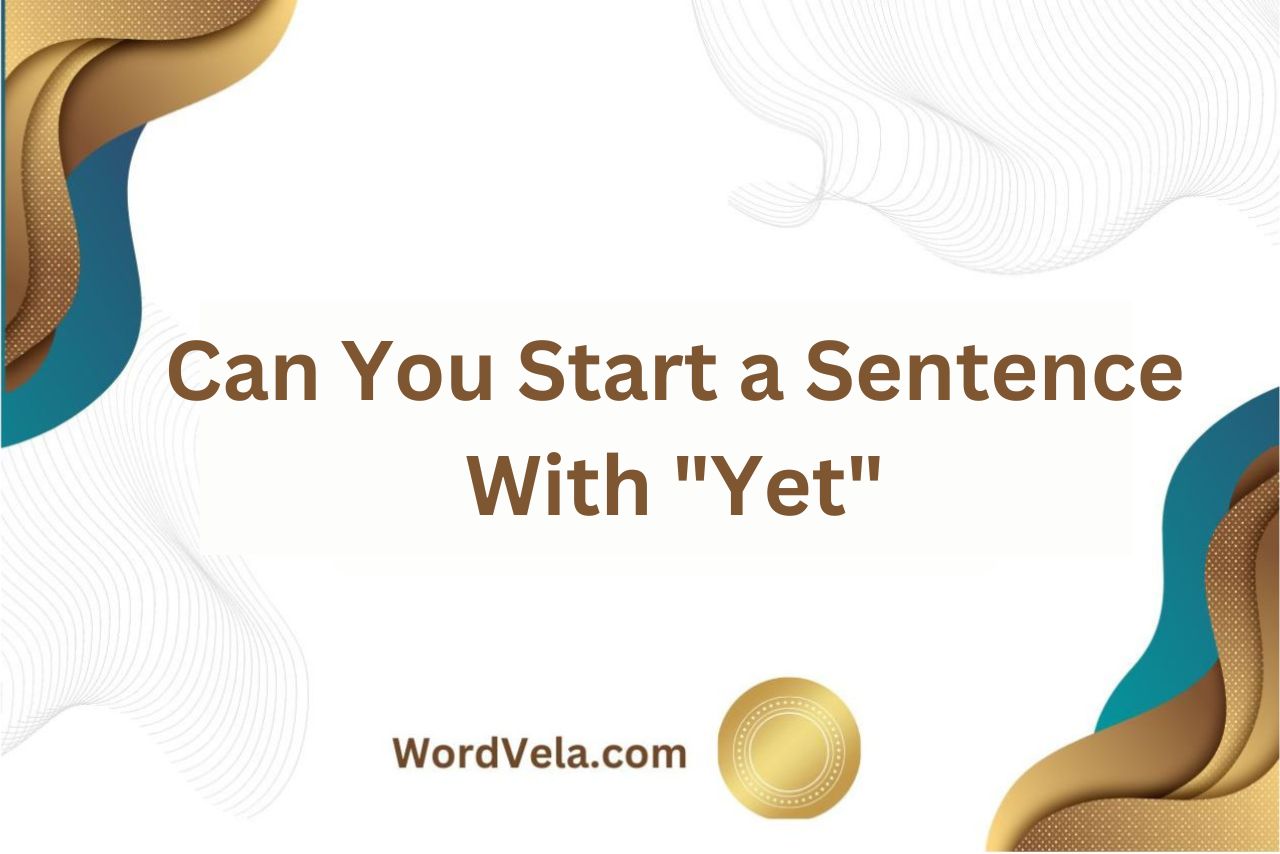Can You Start a Sentence With Yet? Yes, starting a sentence with “yet” is grammatically correct and can be used to introduce contrasting or surprising information in writing.
When used effectively, beginning a sentence with “yet” can add emphasis and create a smooth transition between ideas.
Table of Contents
Can You Start a Sentence with Yet?
Yes, you can absolutely start a sentence with “yet.” It’s a common misconception that you can’t use conjunctions like “yet” or “but” at the beginning of a sentence.
Here’s why starting a sentence with “yet” works:
Sentences with Yet Conjunction:
What Does yet Mean at The Beginning of A Sentence?
When “yet” starts a sentence, it acts as a conjunction to introduce a contrasting idea to the information in the previous sentence. It functions similarly to “but” or “nevertheless,” but with a slightly stronger emphasis.
Here’s a breakdown of what “yet” means at the beginning of a sentence:
How Do You Use but Yet in A Sentence?
It’s actually not recommended to use “but” and “yet” together in the same sentence. They both serve similar purposes – introducing a contrasting idea and using them together creates redundancy.
- Redundancy: Both “but” and “yet” function as contrasting conjunctions. Using them together essentially means “but nevertheless,” which is repetitive.
Here’s what you can do instead:
Choose One: Pick either “but” or “yet” depending on the emphasis you want.
- “But” is a more neutral way to introduce a contrast.
- “Yet” adds a stronger emphasis or introduces a surprising contrast.
Use a Different Conjunction: Consider using a different conjunction like “however” or “nevertheless” to achieve the same contrast without redundancy.
What Are Three Sentences with Yet?
What Does yet Mean?
“Yet” has a few different meanings depending on how it’s used in a sentence.
Here’s a breakdown of the most common uses:
Up to the Present Time (Negative):
This is the most common use of “yet” in questions and negative statements. It indicates that something hasn’t happened so far.
Even Now (Continuing):
This usage emphasizes that something is still ongoing or true even at the present time.
Nevertheless (Contrast):
“Yet” can function as a conjunction similar to “but” or “nevertheless” to introduce a contrasting idea. This is especially common when starting a sentence with “yet.”
Can You Use Before Yet?
The phrase “before yet” is generally not recommended in English grammar.
Here’s why:
Redundancy: “Yet” already implies a point in time that hasn’t been reached yet. Adding “before” creates redundancy because “before” inherently suggests something happening earlier than another point.
If you want to emphasize that something hasn’t happened yet:
- Use “yet” alone. (e.g., “The meeting hasn’t started yet.”)
If you want to show a sequence of events:
- Use clear time markers. (e.g., “First, we need to gather the materials. Then, we can begin the project.”)
Can I Use yet Instead of However?
Yes, you can often use “yet” instead of “however” to achieve a similar effect in a sentence. Both words function as conjunctions to introduce contrasting ideas.
Here’s a breakdown of how they differ slightly:
Similarities:
- Contrast: Both “yet” and “however” connect clauses that present contrasting ideas.
Differences:
Yet Synonyms:
| Context | Formal | Informal |
|---|---|---|
| Up to the present time (negative) | Still, not yet | Not yet, so far |
| In addition (positive) | As well, besides | Too, even |
| Even now (continuing) | Even now, still | Even now, ongoing |
| Nevertheless (contrast) | However, nevertheless | Nonetheless, still |
| At some future time (eventually) | In the future, someday | Someday, one day |
Conclusion and Final Thoughts!
Starting a sentence with “yet” is not only grammatically correct but also adds variety and emphasis to your writing. By understanding the nuances of using “yet” at the beginning of a sentence, you can elevate the clarity and impact of your writing style.
Embrace this flexibility in language to craft engaging and dynamic sentences that capture your reader’s attention effortlessly.
Incorporating “yet” as an introductory word in your sentences allows for smoother transitions between ideas while maintaining coherence and cohesion throughout your writing.
Experiment with different sentence structures that feature “yet” at the start to discover how it can enhance the flow and rhythm of your content effectively.
Latest Posts!
- 9 Proper Ways to Sign a Letter on Behalf of Someone Else!
- Do You Put a Comma After Yesterday? Here Defined:
- 12 Professional Ways to Say I Will Keep You Posted!
- 10 Other Ways to Say Well Received in An Email!
- 12 Other Ways to Say Thank You for Your Attention!
- Secretary’s or Secretaries’ or Secretaries? Which Is Correct?











Leave a Reply